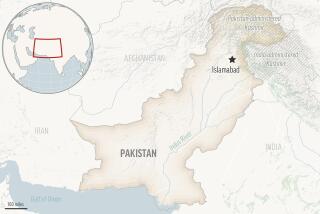Suicide bombers kill more than 65 in Pakistan
Reporting from Islamabad and Peshawar, Pakistan — Suicide bomb explosions tore through a busy market Friday in a volatile tribal region of Pakistan, killing more than 65 people in an attack that illustrated the Taliban’s potency despite several recent military offensives against the insurgents.
The blasts took place in the village of Yakka Ghund outside the offices of a senior administrator for the Mohmand tribal region, police said. At least 112 people were injured. Authorities said one of the bombers was on a motorcycle and the other detonated a Toyota Corolla sedan filled with explosives.
The intended target remained unclear. A large crowd lining up for new national identity cards had gathered at government offices in Yakka Ghund’s main bazaar, and the bazaar itself was filled with midmorning customers. Government offices and bustling markets often are targeted in Taliban suicide bombings.
However, Pakistani television channels reported that members of a local lashkar, or anti-Taliban tribal militia, was meeting nearby when the attackers hit and may have been the intended target.
Pakistan’s Dawn newspaper reported that the Taliban had taken responsibility for the attack.
Shopkeeper Munir Khan said his store was just a few yards from the explosions.
“It was a huge blast, and there was total destruction everywhere,” Khan said. “I saw injured people on the ground and dead bodies burned beyond recognition.”
Televised video of the bazaar showed villagers with shovels searching for survivors and remains amid a wide swath of destroyed storefronts and offices. The explosion left a 5-foot-wide, 4-foot-deep crater in the road.
Rasool Khan, the Mohmand administrator, said authorities were expecting the death toll to rise as rescue workers continued to sift through the rubble.
Mohmand is one of several tribal regions along the Afghan border where Taliban and Al Qaeda militants continue to seek sanctuary.
Pakistan has launched several military offensives in the region — including in the Swat Valley, in Khyber Pakhtunkhwa, formerly known as the North-West Frontier Province, and in the Federally Administered Tribal Areas of South Waziristan, Bajaur, Orakzai and Khyber — in an attempt to uproot the insurgency and put an end to a wave of Taliban-engineered suicide bomb attacks and other terrorism.
The offensives, however, have failed to dismantle the insurgency. The movement’s top leaders remain active, and many militants were able to flee well in advance and find refuge in other parts of the tribal belt.
Times staff writer Rodriguez reported from Islamabad and special correspondent Ali from Peshawar. Special correspondent Nasir Khan in Islamabad contributed to this report.
More to Read
Sign up for Essential California
The most important California stories and recommendations in your inbox every morning.
You may occasionally receive promotional content from the Los Angeles Times.










